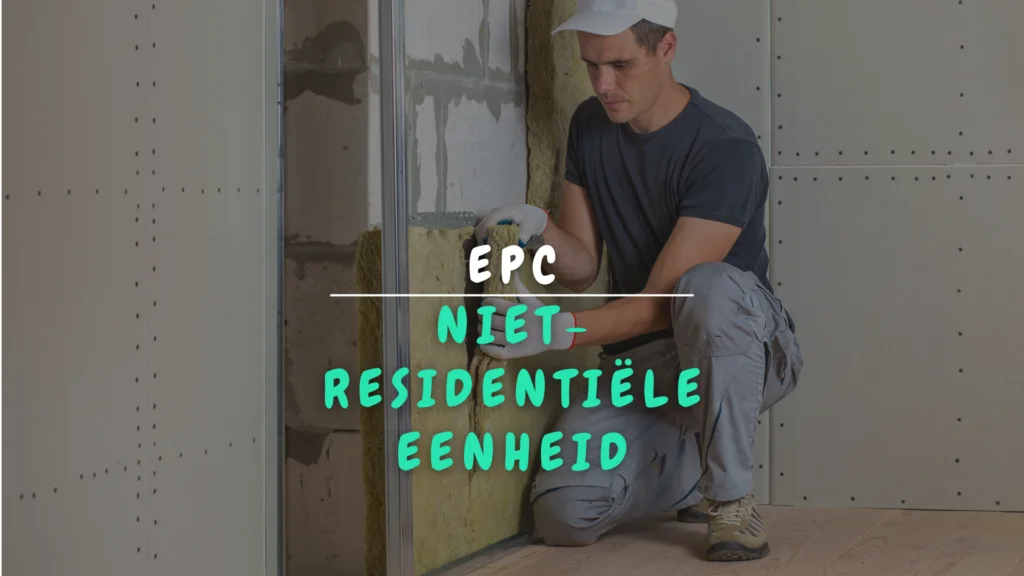Do you own a non-residential unit? If so, you are required to submit the Non-Residential Unit EPC. What does it say? Find out in this article!
What is the EPC Non-residential unit (EPC NR)?
EPC stands for Energy Performance Certificate. The EPC is a document that shows how energy efficient your home is. You will find information about the building envelope, space heating, ventilation, lighting, solar energy and hot water heating.
From January 1, 2025, all non-residential building units with a usable floor area greater than or equal to 1,000 m² in Flanders must have an EPC label. Regardless of sale or rental.
This document is called“EPC Nonresidential Unit (EPC NR).”
This will give potential buyers or tenants an idea of the building’s energy efficiency. As a landlord, you are therefore required to present this document when selling and renting.
What is a nonresidential unit?
Non-residential units:
- are all building units whose principal use is “non-residential.”
- are all building units except residential, industrial and agricultural buildings.
Examples:
- hotels.
- stores.
- schools.
- offices.
- restaurants.
- gyms.
- hospitals.
Exceptions:
- Temporary structures in use for less than 2 years.
- Building units with a usable floor area less than 1,000 m².
What is in the EPC Non-residential unit (EPC NR)?
The EPC Non-residential unit is prepared per house, apartment, studio or collective residential building. The EPC includes:
- The energy score: measured amount of renewable energy consumption and waste heat use relative to total energy consumption.
- The energy label: label X to label A.
- The overview of recommendations to improve energy performance
- An overview of concerns and websites with guidance on how to tackle a renovation
What are the conditions?
Building owner conditions:
- You provide the necessary documents to the energy expert.
- You have to mention the EPC NR compulsorily in advertisements:
- When selling, you are required to transfer the EPC NR
- When renting out, you must give a copy to the new tenant(s).
- A licensed energy expert (Type D) must prepare the EPC.
- A licensed energy expert (Type D) or internal employee (e.g., building manager) must record meter readings at least annually where:
- Meters must meet quality conditions.
- The internal employee must be approved as a Type D energy expert.
- The owner, holder of leasehold or superficies right applies for the certificate himself or has it done by an assignee, agent or proxy.
- The EPC NR must be prepared only if you sell, transfer or lease an entire building unit. You do not have to have one prepared for parts.
Energy expert terms:
- You use supporting documents.
- You record meter readings.
- You must sign the EPC NR.
- You prepare the EPC NR for each building unit.
- You use the government software program in formatting.
- You keep the file of supporting documents and information for 5 years.
Conditions for users:
- You must provide all necessary energy data to the owner.
How much does the EPC NR cost?
There is no set cost for the EPC NR. The price depends on:
- unit size.
- the energy expert (type D).
- unit complexity.
- the travel costs of the energy expert.
How long is the EPC NR valid?
The EPC Nonresidential Unit (EPC NR) is valid for 5 years. However, the certificate must remain current. If you take measures to improve energy performance (e.g.. insulate), then you should have the EPC revised.
What are the benefits of the EPC Non-Residential Unit (EPC NR)?
For renters/buyers:
- It offers an insight into your energy consumption and stay comfort.
- It gives you necessary information to compare with other potential units.
For landlords/sellers:
- With a positive EPC, you rent and sell your unit more easily.
- It gives an overview of what to tackle first and how best to do it – as an owner.
- It makes it easier to decide what renovations are needed.
- Can you demonstrate that you improved the EPC? Then you may be eligible for grants and subsidies.

EPC Non-residential unit application in 5 steps.
Step 1: Collect supporting documents.
The owner or authorized representative shall collect all evidence about the energy performance of the common parts such as insulation, joinery, glazing.
Step 2: Make an appointment with an energy expert
The owner or proxy makes their own appointment with an energy expert (Type A).
Step 3: Energy expert site visit
During on-site visit:
- the owner or authorized representative shall ensure that relevant parts of the building are accessible to the energy expert.
- the owner or authorized representative ensures that the energy expert receives the documents and supporting documents.
- the energy expert examines the rooms, meters and installations.
Step 4: Receive the EPC Non-residential unit
The energy expert sends the EPC NR to the owner or authorized representative.
Step 5: Share the EPC
The recipient shares the EPC with:
- the owner or authorized representative.
- the users.
- the prospective buyers and/or prospective tenants.

The EPC Non-Residential Unit is your guide to a more energy-efficient future! An energy efficient building is not only good for the environment, but also for your wallet and the comfort of all users.
Article tips:
Would you like to cite this article as a source? Then use:
Stiasteny, L. (2024, Dec. 18). EPC Nonresidential unit (EPC NR). Apartment.com. Accessed on (date XX/XX/202X), from https://www.appartement.be/epc-niet-residentiele-eenheid

